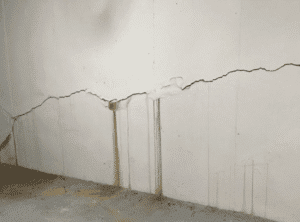Construction Stage Tips to Avoid Foundation Cracks Later Troutville, VA
Foundation cracks are the stuff of nightmares for any homeowner. While small cracks in foundation walls are to be expected due to foundation settlement, larger cracks are often a sign of an underlying problem with the foundation. Their appearance means that the homeowner will sooner or later have to invest in foundation repair.
Many of the problems homeowners face with their foundations can be prevented during the construction of the foundation and the home. Below, we share some tips to help you avoid experiencing foundation cracks in the future. 
1. Hire an experienced and skilled contractor
Hiring the right contractor is one of the most important steps in constructing a home. You will not only want a contractor that is experienced but also one that will provide you with great workmanship. They should have expertise in the construction of homes under local conditions. They should be knowledgeable with local building codes and regulations. They should also be familiar with dealing with various issues that are common in your geographical area such as expanding soils or high water tables.
2. Conduct a thorough site analysis prior to constructing your home
Many of the problems experienced with foundations are a result of not fully understanding the site. Homeowners are surprised to discover years later that they have built their homes on unstable soils for example or in an area with a high water table. It is important to take the time to understand the site condition such as the soil characteristics, how far below ground level the bedrock lies, how water drains on the land and much more. You will be able to address potential problems and therefore avoid problems in the future.
3. Take the time to prepare the site properly
Site preparation is key in protecting the foundation from damage in the long term. It is important to ensure that the landscape is graded properly. It should slope away from the foundation. Vegetation near the foundation should be cleared. You may also have to excavate expanding soils to replace them with more stable grounds.
4. Use quality construction materials
Pay attention to the construction materials used. Ensure that high-quality materials are used especially when it comes to construction of the foundation. You can’t afford to skimp on materials during the construction of the foundation. Using substandard materials will only result in damage to the foundation later. 
5. Adhere to proper construction techniques
Be sure to adhere to proper construction standards and practices. For example, provide adequate reinforcement for the concrete used in your foundation. This is something that your contractor can guide you on. Failing to adhere to construction practices will result in the failure of the foundation structure later on.
6. Invest in waterproofing
This means more than simply applying waterproof membrane on the surface of the foundation. It means investing in a waterproofing system including landscape drainage, gutters and downspouts, and other elements. A comprehensive waterproofing system will provide long-term protection for your foundation.
Contact the Professionals at Seal-Tite Basement Waterproofing Today! 540-992-1144

Seal-tite Basement Waterproofing Co. is a full service basement environment contractor. We carry an A+ Better Business Bureau rating. We repaired over 40,000 homes and structures in Virginia, West Virginia, Tennessee, and North Carolina. We are fully insured and licensed. We have worked in all types of locations, including residential and commercial locations, government agencies, colleges, hospitals, churches, and condo associations.
Seal-tite® offers a lifetime transferable warranty. We carry a Class A Contractor’s License and we are fully insured. Our satisfied customers range from government agencies to businesses, hospitals, colleges, churches, and thousands of homeowners. Your home is probably the single largest investment you will make in your lifetime. Don’t wait, call Seal-tite® to help make your home dry, safe and livable.

